- Quick Read
- Deep Read ( 6 Min. )

Why is Christian Science in our name?
Our name is about honesty. The Monitor is owned by The Christian Science Church, and we’ve always been transparent about that.
The Church publishes the Monitor because it sees good journalism as vital to progress in the world. Since 1908, we’ve aimed “to injure no man, but to bless all mankind,” as our founder, Mary Baker Eddy, put it.
Here, you’ll find award-winning journalism not driven by commercial influences – a news organization that takes seriously its mission to uplift the world by seeking solutions and finding reasons for credible hope.
Explore values journalism About usIn Today’s Issue
- Parliamentary brawl in Jordan: Can voters’ faith be restored?
- Gender parity in Germany: How much did Merkel pave the way?
- Moms in school: From teens in Tanzania to college students in US
- Turning a hot shower into a hub of radical hospitality
- Oscar contender ‘A Hero’ explores the complexities of doing the right thing
Monitor Daily Podcast
- Follow us:
- Apple Podcasts
- Spotify
- RSS Feed
- Download
TODAY’S INTRO
‘Under my own terms’: Sidney Poitier’s power and principles
The pioneering Black actor Sidney Poitier lived his values on screen and always carried himself with dignity and respect.
Mr. Poitier, whose death was announced Friday, often played steadfast heroes thrown into difficult situations, such as a caring London teacher in a tough school in “To Sir, With Love,” a Northern detective on the trail of a murder case in the South in “In the Heat of the Night,” and a doctor whose race surprises his white fiancee’s parents in “Guess Who’s Coming to Dinner.”
All three of those movies appeared in 1967, and were among the top 10 grossing films of that year. By then Mr. Poitier was one of the biggest box office draws of his generation, and the first Black winner of an Academy Award for best actor, for his portrayal of an itinerant handyman who helps nuns build a chapel in “Lilies of the Field.”
Monitor film critic Peter Rainer, who wrote and co-produced a 1997 television biography of Mr. Poitier, wrote in 2020 that along with Cary Grant he was “probably the most elegant of all Hollywood movie stars,” as well as “one of its greatest actors.”
But while the film industry of the late 1950s and early 1960s made Mr. Poitier a star, it also was still rife with stereotypical attitudes about what Black actors could do. Mr. Poitier faced down these attitudes by declining to go along with them. He told an interviewer in 1998 that he had turned down a number of roles he felt demeaning.
“I was here under my own terms, and I knew I had no power to influence except the power to say ‘no,’” he told the interviewer.
Underneath he was still angry about racial injustices, but he kept the anger at bay with iron self-control. He said he learned in the end that he had to find positive outlets for his “demons” or they would destroy him.
His flame of anger burned “because the world is so unjust. I have to try to find a way to channel that anger to the positive, and the highest positive is forgiveness,” Mr. Poitier wrote in his memoir, “The Measure of a Man: A Spiritual Autobiography.”
Share this article
Link copied.

Help fund Monitor journalism for $11/ month
Already a subscriber? Login

Monitor journalism changes lives because we open that too-small box that most people think they live in. We believe news can and should expand a sense of identity and possibility beyond narrow conventional expectations.
Our work isn't possible without your support.
Parliamentary brawl in Jordan: Can voters’ faith be restored?
In the kingdom of Jordan, Parliament is a once-revered democratic institution. To restore its stature, is it enough to improve representation without giving the “people’s house” a stronger voice?
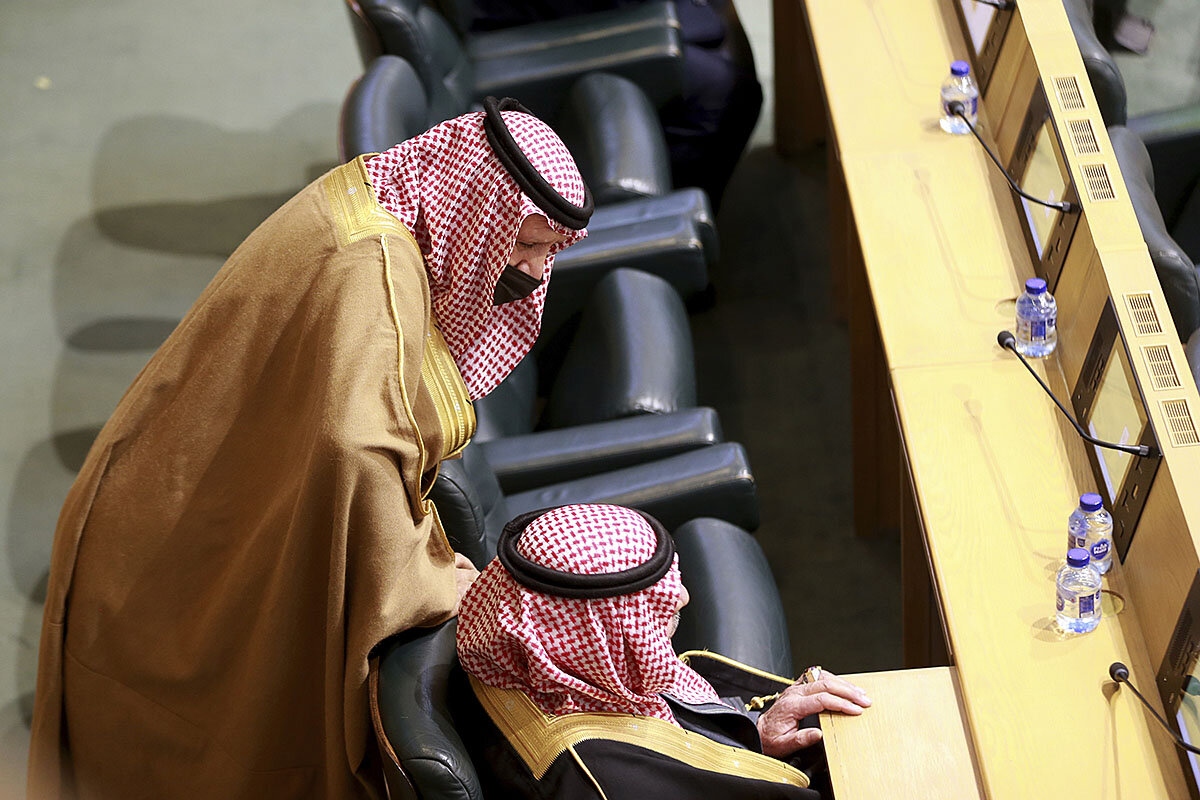
Once revered as the “people’s house,” Jordan’s Parliament is now being dismissed by some as a “house of embarrassment.” A reminder why was a mass brawl last week amid a debate over constitutional amendments that featured punches, body slams, and a house speaker ordering lawmakers to “shut up!”
With faith in democracy and its institutions under siege around the world, and authoritarians flexing their own political muscles, voters in Jordan say they have given up on an institution that simply rubber-stamps legislation submitted by the king-appointed government.
A royal committee is rushing reforms through Parliament to rebuild Jordanians’ trust in the system and regain their faith in the elected body. Among them are steps to restore national parties’ representation and raise the voices of women and young people.
But with them have also come a host of constitutional amendments that activists and legal experts say have gutted Parliament’s powers. The amendments have passed through Parliament this week with little discussion.
“They have stripped Parliament of all its authority,” says Rula al-Hroub, leader of a center-left party and a former member of Parliament. “As a political party, why should I run in the next elections? What is even left for political parties?”
Parliamentary brawl in Jordan: Can voters’ faith be restored?
Increasingly, Jordanians say they think little of Parliament, if they think of it at all.
Once revered as the “people’s house,” Parliament is now being dismissed by some as a “house of embarrassment.”
A reminder why was a mass brawl last week during a debate over constitutional amendments that featured punches, body slams, headlocks, and a house speaker ordering lawmakers to “shut up!” It gave another black eye to an institution seen as less representative, or relevant, than in the past.
Two decades of gerrymandering and electoral engineering by governments eager to suppress dissent have filled the legislature with MPs hand-picked for loyalty but lacking ideology or policies.
“Our Parliament is a sideshow; we don’t hear from them when it matters, and when we do hear from them, we wished we hadn’t,” says Bassam, a former military officer who asked that his full name not be used. “Our representatives don’t represent anyone but themselves.”
With faith in democracy and its institutions being tested around the world, and authoritarians flexing their own political muscles, voters in Jordan say they have given up on an institution that simply rubber-stamps legislation submitted by the royally appointed government.
“We vote for people to stand up to government policies, but they let us down each time,” says Bassam. “They only do what the government wants.”
Some say MPs publicly rail against unpopular government proposals, such as tax hikes, but then just fall in line.
“Ninety-nine MPs scream and shout they are against a law, but one telephone call later and they all vote in favor of it the very next day,” says Abdullah Youssef, a clerk in Amman.
Says Oraib Rantawi, director of the Amman-based Al Quds Center for Political Studies: “Jordan today is one of the only countries in the world where people are happy when the king dissolves Parliament.”
Vote of no-confidence
A royal committee is rushing reforms through Parliament it says can rebuild Jordanians’ trust in the system and regain their faith in the elected body.
Among the changes are steps to restore national parties’ representation and increase roles of women and young people in party politics.
But those moves, which coincide with others that reduce Parliament’s authority, may do little to restore the body’s stature.
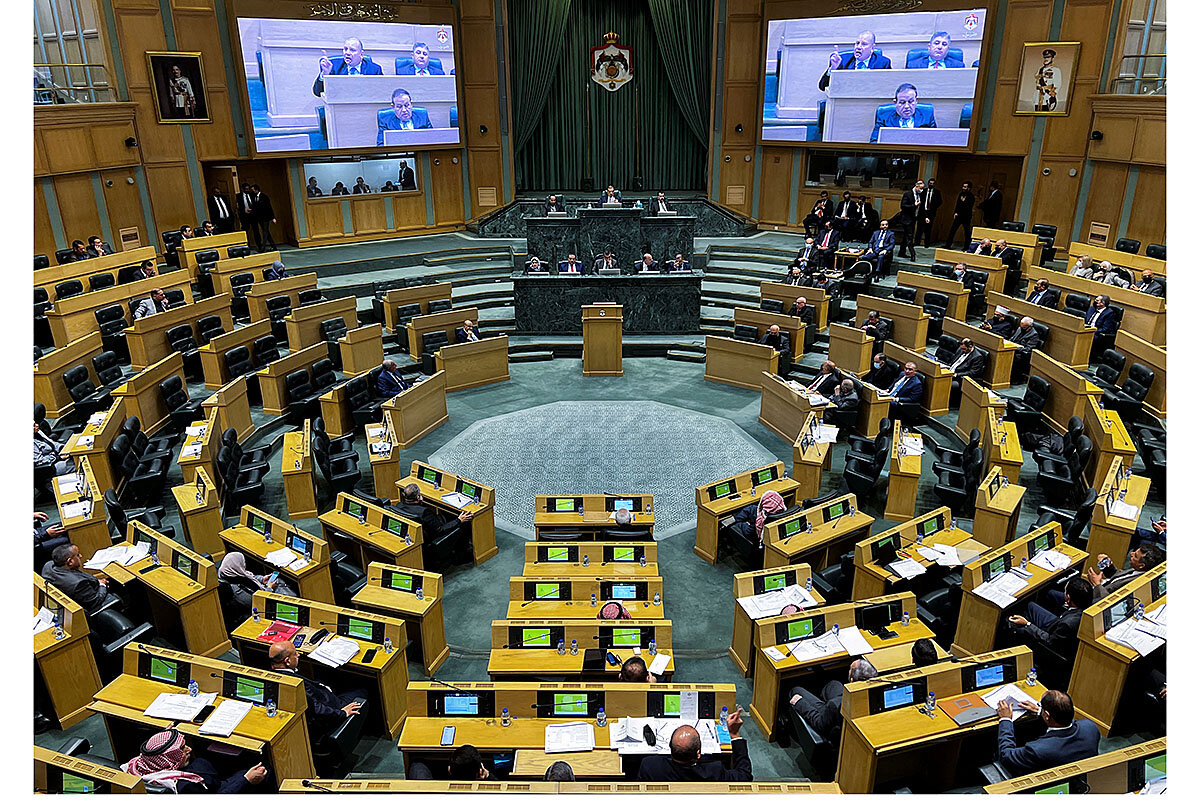
In an October public opinion survey by the Center for Strategic Studies at the University of Jordan, 15% of Jordanians expressed confidence in Parliament, making it the least-trusted institution in the kingdom, behind the army (91%), judiciary (53%), media (39%), unions (36%), and the government (33%).
In October 2020 parliamentary elections, 29% of eligible voters cast a ballot – the lowest participation rate ever in a Jordanian legislative election.
Mr. Rantawi says the plunge in support “comes after attempts by successive governments to discredit Parliament in the minds of the people and reduce Parliament’s role in the political process.”
It is an accusation repeated by MPs.
“In Jordan, Parliament is the people’s power. The only way to take away people’s power is to convince them that they no longer have it,” says Saleh Armouti, an opposition MP aligned with the Muslim Brotherhood’s Islah coalition. “This is why the government sabotages Parliament – to make it appear incapable of bettering people’s lives.”
Islamist “scare”
The directly elected body was celebrated by Jordanians when it was reintroduced after a 22-year absence in 1989 by King Hussein, who lifted martial law in the face of mass protests over rising prices.
The 1989 elections saw a 54% turnout. The Muslim Brotherhood’s Islamist party snagged 22 out of the then-80 seats in the legislature, creating the largest bloc.
In 1993, faced with the rising influence of the Brotherhood and opposition voices as Jordan neared a peace treaty with Israel, the government amended the elections law to minimize the presence of outspoken parties.
With each subsequent election, the government altered the system further to favor independent, tribal, and regional candidates over political parties.
For the past two decades, these laws combined with gerrymandering, rampant vote-buying, and alleged interference by security services to fill Parliament with pro-regime loyalists and others without party affiliation, political ideology, or policy proposals.
Only a dozen independents and opposition figures reached Parliament each election.
“Money, tribalism, special interests, and the interference of state agencies have created bad Parliaments that do not represent Jordanians’ dreams, wishes, and aspirations or even reflect their own ideas and values,” says Rula al-Hroub, an MP from 2013 to 2016 and secretary-general of the secular, center-left Stronger Jordan Party.
With the influx of independent candidates, Parliament became dominated by performance politics.
Unable to vote against or defeat government motions, many MPs instead took to shouting and threatening violence in theatrical forms of aggression that made them appear tough to their constituents – without the hard work of legislating policy.
But in recent years, even the performance art has lost its political edge.
The brawl last week, which erupted during a discussion to add “Jordanian women” to the constitution’s preamble protecting individuals’ rights, was over a perceived personal slight between MPs.
“The vast majority of MPs come in as individuals, so they believe in their own egos, their sub-identities, their region, and their tribe. They have no political identity or agenda by which to organize their work,” says Amer Bani Amer, director of Rased, an election- and Parliament-monitoring nongovernmental organization.
“They are not accepting of an open dialogue, and this is a reflection of broader trends in society.”
Repairing the social contract
The loss of faith in Parliament comes at a time of acute economic hardship and social unrest in the kingdom.
The unemployment rate hovers around 28%. Jordanians’ trust in one another is at an all-time low.
Last summer, weeks after an alleged coup plot involving his half brother, King Abdullah formed a committee of politicians and experts across the political spectrum to help reboot and modernize the country’s political system “for a new and critical phase.”

The royal committee zeroed in on saving Parliament as key to repairing the social contract.
The committee’s reforms include reserving 30% of Parliaments’ seats for political parties at the national level, to be raised incrementally to 60% of seats over successive elections.
Others include requiring that political parties’ membership be at least 20% women and 20% below the age of 35, and lowering the minimum age for MPs to 25.
But with these changes have also come a host of constitutional amendments that activists and legal experts say have gutted Parliament’s powers, and broadened the king’s powers.
They include removal of an article requiring the prime minister to resign following the dissolution of Parliament – opening the door for king-appointed governments to govern in the absence of Parliament – and another measure granting the king the authority to appoint and remove senior officials and judges.
The amendments also formed a new body, the National Security Council, hand-picked by the king, which would exert authority over foreign policy and security outside parliamentary oversight.
What is left for parties?
These amendments have been rushed through Parliament this week with little discussion.
“They have stripped Parliament of all its authority,” says Ms. Al-Hroub, the former MP. “As a political party, why should I run in the next elections? What is even left for political parties?”
Many Jordanians are nonplussed by the amendments, if they have heard of them.
“No changes they make to Parliament, the law, or constitution will change the fact that they don’t want us to have a say in economic policy at home or foreign policy abroad,” says Zayd, a 30-something plumber.
“If I see a political party that represents my demands for a fair economy, cracking down on corruption, and ends all cooperation with Israel, I would vote for them,” says Rawwan, a university graduate. “But I doubt that any political party will be allowed to say what Jordanians actually think.”
For now, the brawls, near and far, give some pause.
“If American political supporters can ransack the Capitol and destroy Congress, what hope do we have for our MPs here in Jordan?” says Mohammed Hamzah, a taxi driver.
Not all Jordanians are pessimistic, however.
Ahmed, an engineering student paying for university by waiting tables at a downtown Amman restaurant, says reforms encouraging youth to enter politics could pave the way for positive change.
“If we can have more youth in Parliament and streamline my generation’s vision with the experience of veteran MPs, we can do a lot of good for our country,” says Ahmed, who doesn’t rule out running for office one day.
“We have many things to contribute to better our country. All we need is the opportunity.”

Gender parity in Germany: How much did Merkel pave the way?
Labels, both good and bad, often mean little. That’s why Angela Merkel’s refusal to call herself a feminist hasn’t gotten in the way of women rising to power in today’s Germany.

- Quick Read
- Deep Read ( 5 Min. )
Even though Germany was led by Angela Merkel for 16 years, the reality for women in Germany has been remarkably unprogressive. In Parliament, women hold only 35% of seats, while only three of Germany’s 16 states are led by women. In Germany’s corporate sector, men dominate, with more than 600 male executives to only 93 women serving on the boards of companies making up Germany’s main stock market indexes.
But as a new Cabinet gets to work in Germany, the former chancellor’s greatest legacy might be laying down the path for women that follow. The new chancellor, Olaf Scholz, has appointed eight women to his Cabinet, including the key positions of foreign affairs, security, and defense in Europe’s powerhouse economy. That makes the gender balance in his Cabinet exactly 50-50, representing the society in which Germans live.
“It’s definitely a strong sign on a symbolic level. Already under Ms. Merkel, women in political leadership appeared more and more frequently, even in rightwing parties,” says Annette Henninger, a politics and gender relations professor at Philipps University of Marburg. “Now it seems that gender stereotypes are really starting to change.”
Gender parity in Germany: How much did Merkel pave the way?
Angela Merkel, the former German chancellor, refused to call herself a feminist. But after stepping down last year following 16 years in power, it’s now clear her strongest legacy might be the path she’s paved for other women.
Chancellor Olaf Scholz has appointed eight women to his Cabinet, including the key positions of foreign affairs, security, and defense in Europe’s powerhouse economy. That makes the gender balance in his cabinet exactly 50-50.
“We’re sure it’s the right thing to do ... that represents the society in which we live, in which men and women each make up half of the population and in which it should be normal that women have half the power,” Mr. Scholz said in a press conference last month announcing the picks.
There’s much to be done, such as narrowing the gender pay gap, providing paternity leave, and boosting more women into STEM fields. But many experts view gender parity in the Cabinet as an important first step toward progress for Germany, which has lagged on many of the traditional metrics.
“It’s definitely a strong sign on a symbolic level. Already under Ms. Merkel, women in political leadership appeared more and more frequently, even in right-wing parties,” says Annette Henninger, a politics and gender relations professor at Philipps University of Marburg. “Now it seems that gender stereotypes are really starting to change.”
On the rise
Ms. Merkel has long been a rare female leader in the conservative Christian Democratic Union (CDU). And, while her ascendance to German chancellor was hailed around the world – during President Donald Trump’s tenure she was oft-referred to as the last defender of liberal democracy – women at home found limited success under her helm.
As chancellor, Ms. Merkel did appoint Germany’s first and second female defense ministers, Ursula von der Leyen and Annegret Kramp-Karrenbauer. But Ms. Kramp-Karrenbauer struggled to consolidate power within her political party and later stepped down from political life. Annalena Baerbock’s rousing ascendance as a Green Party candidate for chancellor lasted only weeks, and she was roundly attacked online and in the media. The treatment, experts said, was rooted in gender bias.
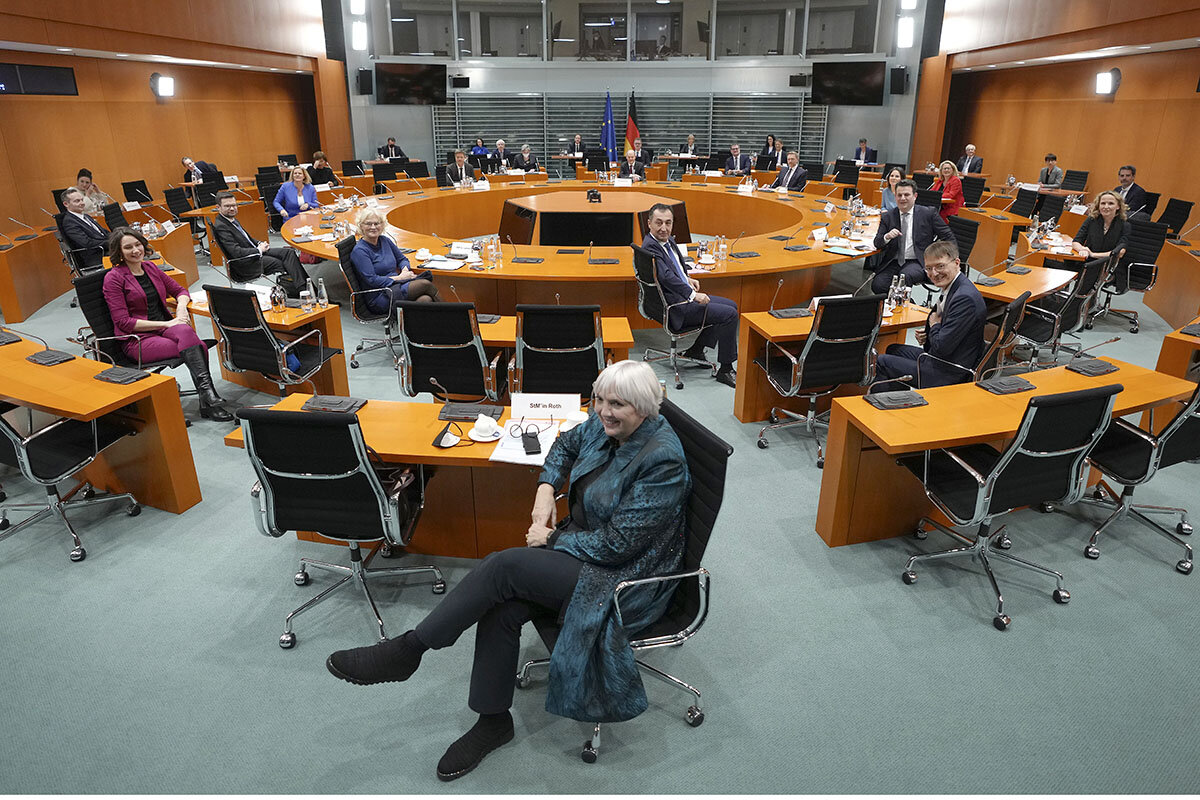
Ms. Merkel herself never proclaimed a strong position on women’s rights, perhaps because she couldn’t in a male-dominated political world. She had spoken out for the need to put more women on Germany’s corporate boards, but within the CDU she had to tread carefully.
“She certainly has experienced enough misogyny in her time – back in the 90s the CDU was full of terrible men,” says Ursula Münch, political scientist and current director of the independent think tank Academy for Political Education in Bavaria.
“Female empowerment was never something Merkel did openly,” she says. “She didn’t consciously play that card because she knows that with this card, you can only win over those who are already on your side.”
In Berlin in 2017, when Ms. Merkel was asked whether she is a feminist, she responded with a bland non-answer: “To be honest, the history of feminism is one with which I have common ground but also differences, and I don’t want to embellish myself with a title I don’t have.”
Indeed, the reality for women in Germany has been remarkably unprogressive. In Parliament, women hold only 35% of seats, while only three of Germany’s 16 states are led by women. In Germany’s corporate sector, men dominate, with more than 600 male executives to only 93 women serving on the boards of companies making up Germany’s main stock market indexes, according to the AllBright Foundation.
Women are paid on average 80% of what men make in Germany, marking one of the highest gender pay gaps among European Union member states. Germany’s criminal code also makes abortion – both for the woman seeking one and the practitioner performing the procedure – technically punishable by fines or prison time. Another section prohibits advertising for abortions.
Working mothers also need easier access to child care, and income needs to increase in professions dominated by women, such as nursing, says Dr. Henninger. Women’s shelters also need more resources.
Changing minds
In other words, there’s plenty of work to do. Yet, hopes are high that Germany’s first gender-equal Cabinet will mark a new chapter.
For starters, as Chancellor Scholz has said, “Security will lie in the hands of strong women in this government.”
The Cabinet members in charge of security have already touted a harder line than their predecessors. The foreign minister, Ms. Baerbock, wants Germany to take a tough stance in addressing Russia’s regional, and China’s global, ambitions. The interior minister, Nancy Faeser, has promised to fight far-right extremism and threats to Germany’s liberal democracy. Christine Lambrecht, who will oversee defense, has vowed to properly fund Germany’s military, which has for years been under-resourced.
And there’s talk that attention will finally be paid to advancing women-friendly policies. Agenda 2030, a package of sustainable development goals that include gender equality, contains milestones such as reducing the gender pay gap, encouraging more girls to enter STEM fields, and boosting the percentage of women on companies’ supervisory boards to 30%.
“We expect that all departments will take responsibility and actively develop the government’s equality strategy,” says Elke Ferner, chairwoman of U.N. Women Germany.
Today women with small children are now in leading government positions, which represents a sea change from the time when people speculated about former Defense Minister and current European Commission President Ms. von der Leyen’s child care arrangements. (She has seven children.) “Now, the question of ‘Can she really do that?’ is not being asked anymore,” says Dr. Henninger.
“Women in Germany have gotten stronger over the past years. They have organized themselves across all sectors and age groups and found their voice,” says Jutta Allmendinger, a gender inequality expert and president of the research institute WZB Berlin Social Science Center. “I think Olaf Scholz really had no other choice.”
As the first woman at the head of the government, Ms. Merkel set a standard that Germany now must build upon, says Ms. Ferner of U.N. Women Germany. “Now it’s about changing basic conditions so that equal participation for women is possible in all areas.”

Points of Progress
Moms in school: From teens in Tanzania to college students in US
In our progress roundup, there’s recognition of the extra burdens mothers carry as caregivers, a step toward reconciliation between New Zealand and an Indigenous group, and some environmental news.
Moms in school: From teens in Tanzania to college students in US
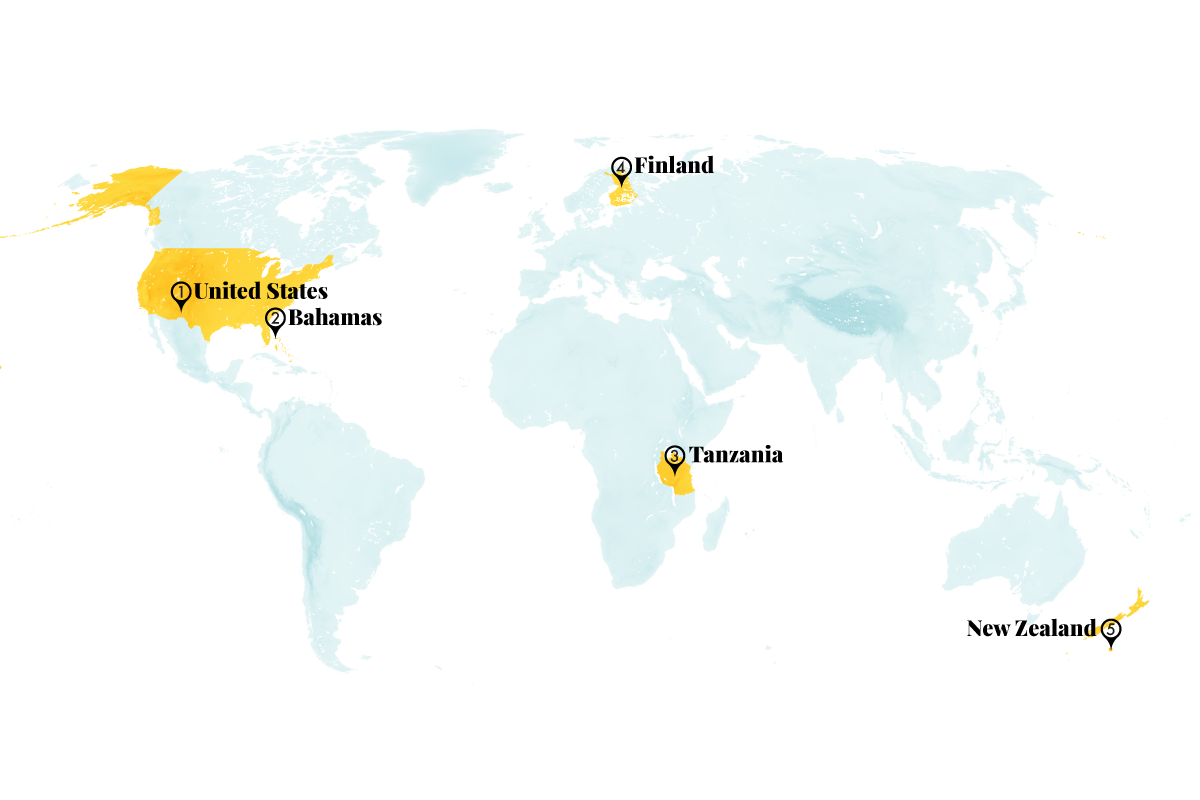
According to the Institute for Women’s Policy Research, nearly 10% of all U.S. undergraduate students, or 1.7 million students, are single mothers. We cover new opportunities for that group and also share strategies to restore natural areas damaged by climate change and human activity.
1. United States
A cohort of community colleges is making it easier for single moms to earn degrees. Only 8% of single mothers attending college – most of whom are low-income students – will graduate with an associate or bachelor’s degree within six years, and they are more likely than all other women to have started but not finished college. Central New Mexico Community College in Albuquerque, Delgado Community College in New Orleans, Ivy Tech Community College in Indianapolis, and Monroe Community College in Rochester, New York, each received $50,000 in funding to interview single mothers on campus and address their challenges. The resulting pilot programs aim to increase single mothers’ degree attainment by 30% at each school by the end of the 2023-24 school year.
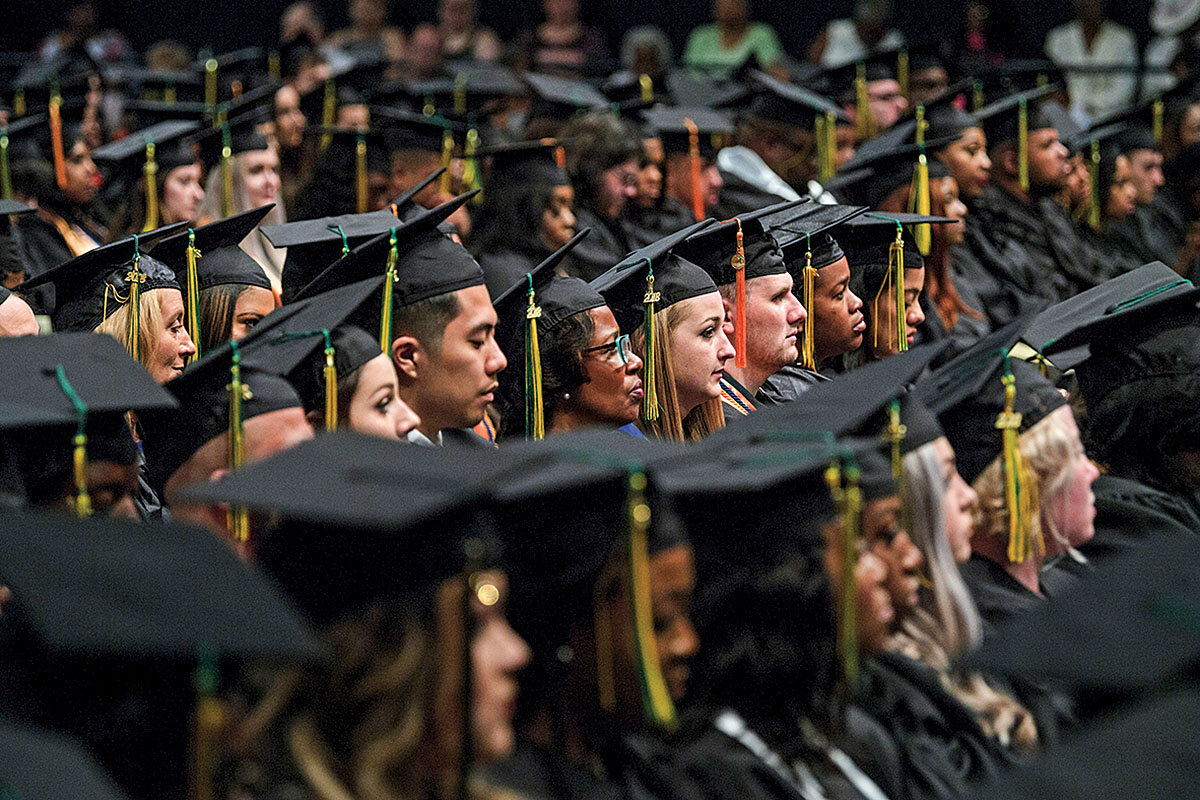
A recent report by the nonprofit Education Design Lab, which tests program models for underserved students and selected the participating schools, outlines the new support systems, which include scholarships and emergency funds for single parents, tailored career and academic coaching, expanded child care options, and opportunities for community building. “We aren’t just helping our students who are parents,” said Mary Ann Matta DeMario, an institutional research specialist at Monroe Community College. “We are helping multiple generations.”
Inside Higher Ed, Institute for Women’s Policy Research
2. Bahamas
A coral farm in Freeport, Grand Bahama, is working to restore lost reefs by breeding climate-resistant corals on land. Home to more than a quarter of all marine species, coral reefs support the livelihoods of millions of people. But warming waters and an increase in ocean acidity have already destroyed half of the world’s reefs, and two-thirds to virtually all could be lost by 2050.
That’s why Yale School of Forestry & Environmental Studies graduates Sam Teicher and Gator Halpern launched Coral Vita in 2019. The first-of-its-kind farm uses table-sized tanks to plant small fragments of native coral, which grow up to 50 times faster than they would in the wild. Water in the tanks is manipulated for temperature and acidity to build resilience. The Coral Vita model avoids many of the challenges associated with traditional underwater coral farming: Staff members have better access to the coral, the tanks can be protected from natural disasters, and it’s easier to scale up. Earlier this year, the group won an Earthshot Prize for environmental innovation, and plans to use the prize money to build a global network of coral farms.
Euronews, Fast Company, National Oceanic and Atmospheric Administration

3. Tanzania
Tanzania lifted a controversial ban prohibiting young mothers from returning to school after pregnancy. The law was introduced in 2002 and reaffirmed in 2017 by then-President John Magufuli, who said the students who were pregnant or had been pregnant would be an immoral influence on their peers. Schools could also require girls to take random pregnancy tests.
Effective immediately, teenage mothers now have a two-year window to return to school after giving birth, according to the Ministry of Education. Some see the move as an attempt by Samia Suluhu Hassan, Mr. Magufuli’s successor and the country’s first female president, to distance her government from the Magufuli administration. The change is not legally binding, and does not allow pregnant students to remain in class. “We are excited with this announcement for now, so let us celebrate,” said Tike Mwambipile of the Tanzania Women Lawyers Association. “This is a step towards meaningful change. ... Time will tell if this is posturing or not. But I think they mean business.”
The Citizen, The Guardian
4. Finland
Finnish communities are working together to restore ecosystems devastated by climate change and human development. In the late 1990s, seeing how warming winters threatened biodiversity and Indigenous culture in Finland, a group of fishers, scientists, and activists started traveling to remote Arctic villages to document Indigenous traditions and environmental knowledge. They eventually established Snowchange, a network of communities throughout Finland, to expand their efforts.
In 2011 – after pollution from a nearby peat extraction site wiped out fish stock in the eastern village of Selkie – the cooperative focused its mission on rewilding, the restoration of an area to its natural state, with a goal of less human intervention. Funded by its commercial fisheries and international partners, Snowchange began buying former peat production sites and transforming them back into wetlands. The initiatives have proved effective: Ten years ago, only four bird species lived on the Linnunsuo wetland site in Selkie, but today, it’s a refuge for 195 different kinds of birds. In addition to advocating for Indigenous climate research globally, Snowchange is scaling up this concept of rewilding at home. It now operates on nearly 70,000 acres across 41 sites in Finland.
Pioneers Post, Snowchange
5. New Zealand
The New Zealand government has finalized a treaty recognizing the Moriori people and their history on Rēkohu, or the Chatham Islands. The original settlers of the southeastern archipelago followed a strict code of peace starting in the 1500s. The community’s nonviolence left them vulnerable when European settlers arrived in 1791, and in 1835, when mainland Maori tribes invaded the islands, killing and enslaving the Moriori inhabitants. In the early 20th century, the Moriori population on Rēkohu dropped to 31, though historians wrongly portrayed the group as an inferior and extinct race. There are an estimated 3,000 to 6,000 people of Moriori descent living in New Zealand today.
The treaty includes an agreed account of Moriori history, an apology from the Crown, and a settlement worth more than $12 million. This agreement is the first step in reconciliation, say Moriori descendants. “The fact that our stories are coming to light, and people are showing interest is huge,” says Rāhiri Edwards-Hammond, adding that it’s important for Moriori people like her to begin “getting to know ourselves again.”
The Guardian, New Zealand Herald
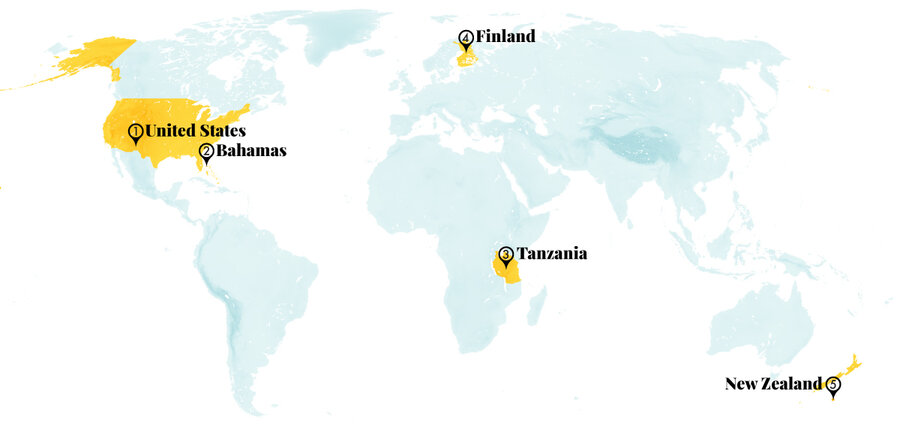

Listen
Turning a hot shower into a hub of radical hospitality
LaveMaeX CEO Kris Kepler tells us about an organization that leverages the power of hospitality, hope, and empathy to create a gateway out of homelessness. This is episode 7 of our “People Making a Difference” podcast.

LavaMaeX, says CEO Kris Kepler, is a nonprofit organization designed to provide people experiencing homelessness with both the hardware (a mobile shower) and the “software” (empathy and hope). The shower is often the first step in restoring dignity and rekindling optimism. It’s what Ms. Kepler calls “radical hospitality,” a mindset of forming a relationship with a guest rather than simply making a transaction.
After a shower, the guest may avail themselves of more than a dozen services in the Pop-Up Care Village, ranging from a haircut to a job interview.
“We’re not just showing up, one month at a time. It’s weekly. And having that consistency and that compassion, and establishing that relationship with guests, it makes a world of difference,” Ms. Kepler says. It’s “really important for us to stay connected and show them our love.” – Dave Scott, audience engagement editor
You might have seen the Monitor story we wrote about Lava Mae on June 4, 2019. We wanted to check in with this organization, and take you a little deeper with an audio interview. Today’s audio story is meant to be heard, but we appreciate that listening might not be an option for everyone. Find a transcript here.
LavaMaeX: Hot showers and radical hospitality

Film
Oscar contender ‘A Hero’ explores the complexities of doing the right thing
Should people be praised for simply doing what’s expected of them? This year’s Oscar contender from Iran, “A Hero,” asks audiences to consider how society uses labels like “good” and “bad.”
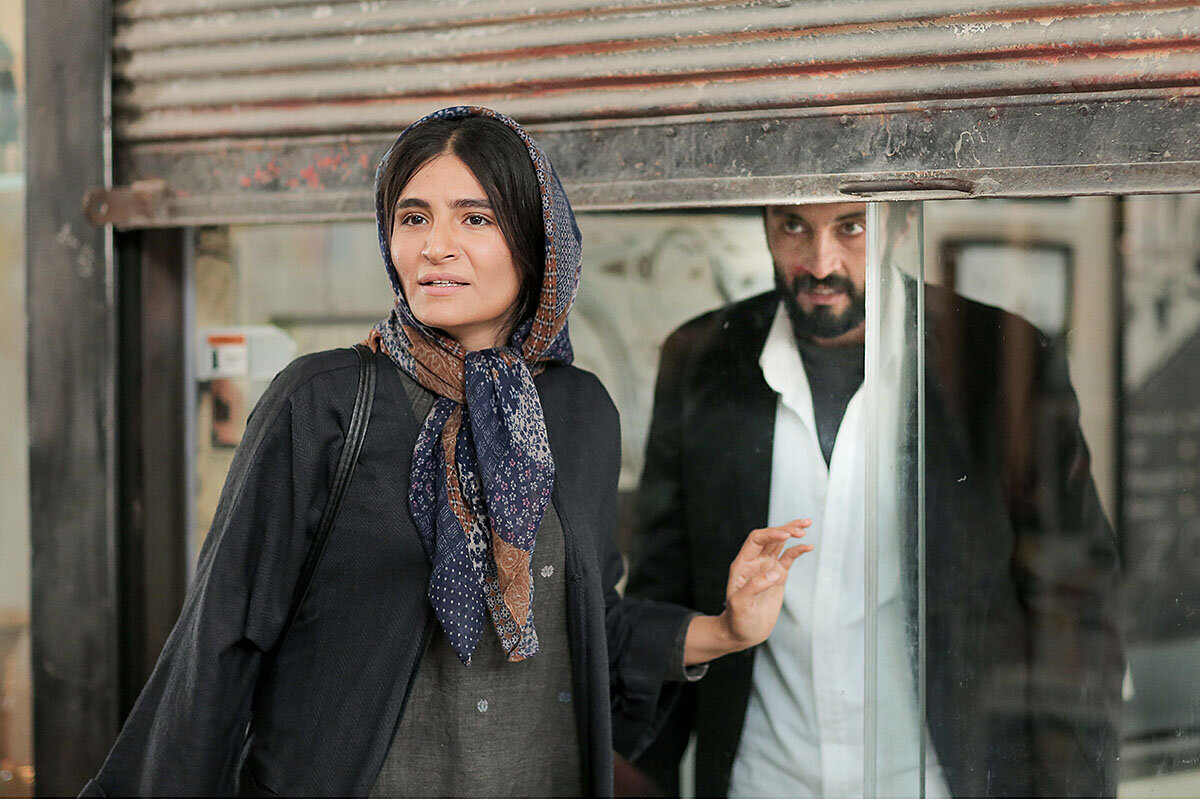
-
By Peter Rainer Special correspondent
Oscar contender ‘A Hero’ explores the complexities of doing the right thing
The title of the new Iranian movie, “A Hero,” is ironic. There are no real heroes in this film, and no bad guys, either. The writer-director, Asghar Farhadi, best known for his Oscar-winning 2011 masterpiece “A Separation,” is too much of a humanist to resort to the tactics of melodrama.
The credo of the great French director Jean Renoir, to whom Farhadi has sometimes been compared, was that “in this world, there is one awful thing, and that is that everyone has their reasons.” And so it is in “A Hero,” which is shortlisted for a best international feature film Oscar. Just when you think you’ve pinned down someone as good or bad, the tables are turned and the complexities thicken. Just like in real life.
Rahim (Amir Jadidi), the film’s lead protagonist, has been serving time in a medium-security prison for nonpayment of a debt. Let out for a few days, he seeks to make amends with Bahram (Mohsen Tanabandeh), his irate creditor, by offering a down payment on the amount owed. This proposed partial restitution, derived from a bag of 17 gold coins found on the street by the divorced Rahim’s girlfriend, Farkhondeh (Sahar Goldust), is the crux of the narrative’s increasingly convoluted complications.
Originally Rahim inquired into redeeming those coins for cash, but since the price of gold has dropped, the estimated amount is rejected by Bahram. Only then does Rahim attempt, instead of cashing in the coins, to publicly seek out the owner of the bag. (A distraught and seemingly believable woman comes forward and claims it.) His supposed selflessness attracts the favored attentions of both the prison authorities and a charitable social services agency. He becomes a minor media sensation. But Bahram suspects there is more to the story, as does a potential employer, who demands to speak to the woman who claimed the coins, and who can’t be found. So Farkhondeh attempts to impersonate her.
You can see where all this is going. Farhadi piles on the entanglements not in the service of histrionics, but instead as a way to capture life’s intricacies in all its permutations. Rahim’s plight is both comic and tragic. He knows he’s not a hero, and yet, propelled by the heroic vision most others hold of him, he begins to believe his own charade. There is at least one moment, though, when he draws the line: The media tries to exploit his son (Saleh Karimai), who has a severe stutter, for sympathy, and Rahim makes it clear he doesn’t want the boy, who clearly idolizes him, to be seen in that way. The emotional connection between father and son is in some ways the film’s most poignant aspect, especially when we can see the toll Rahim’s imbroglios are having on the child.
The film doesn’t only belong to Rahim, or his extended family. A comprehensive cross section of Iranian society comes through: the shopkeepers, small-business owners, media hounds, social-service workers, police.
Jadidi is particularly well cast as Rahim. There’s a slight opaqueness to his bearded good looks. When he smiles, which is most of the time, even when things are going badly, you can’t really fathom his true feelings. He has a con artist’s benign unreadability, and yet, he’s really not a grifter, just a man for whom a small lie has exploded into a large transgression that has taken on a life of its own.
In his own halfhearted way, Rahim is trying to behave virtuously. He wants to regain his dignity. Having been incarcerated, and facing a return to prison, he craves the respect he attracts from his brief, minor celebrity. He says he did nothing special in returning the money. Despite the humblebrag of his comments, he’s correct. But his creditor has a more cynical take: Why, he asserts, should Rahim be praised for simply doing the right thing?
What “A Hero” demonstrates is that doing the right thing is rarely as simple as it seems.
Peter Rainer is the Monitor’s film critic. “A Hero,” which includes subtitles, opens in theaters Jan. 7 and will be available on Amazon Prime Video Jan. 21. The film is rated PG-13 for some thematic elements and language.
Other headline stories we’re watching
(Get live updates throughout the day.)The Monitor's View
A brighter future: How do we get there?
- Quick Read
- Deep Read ( 2 Min. )
-
By the Monitor's Editorial Board
To quote baseball philosopher Yogi Berra, “The future ain’t what it used to be.”
It can be a challenge not to make long, mental worry lists about what might lie ahead. But a more productive mindset might ask: What should the future be like? How do we make it better than today?
In a winter of international and domestic U.S. tensions, a new exhibition titled “Futures” at the Smithsonian Institution in Washington invites visitors to explore intriguing exhibits showing future possibilities. It then asks them to join in creating that future, such as in designing a city of tomorrow (with an assist from some artificial intelligence).
What about a ground-based, 600 mph tube transit system that could transport travelers between American cities in minutes? That’s just one possibility presented.
“What we want people to take away is that there are solutions out there, there are answers out there,” Rachel Goslins, director of the Smithsonian’s Arts and Industries Building, told The Guardian. “We have to pick them, and we have to invest in them.”
As 2022 unfolds, inspiration and creativity are needed more than ever. Fresh ideas are available to any of us as we stop and quietly listen for our own best thoughts.
A brighter future: How do we get there?
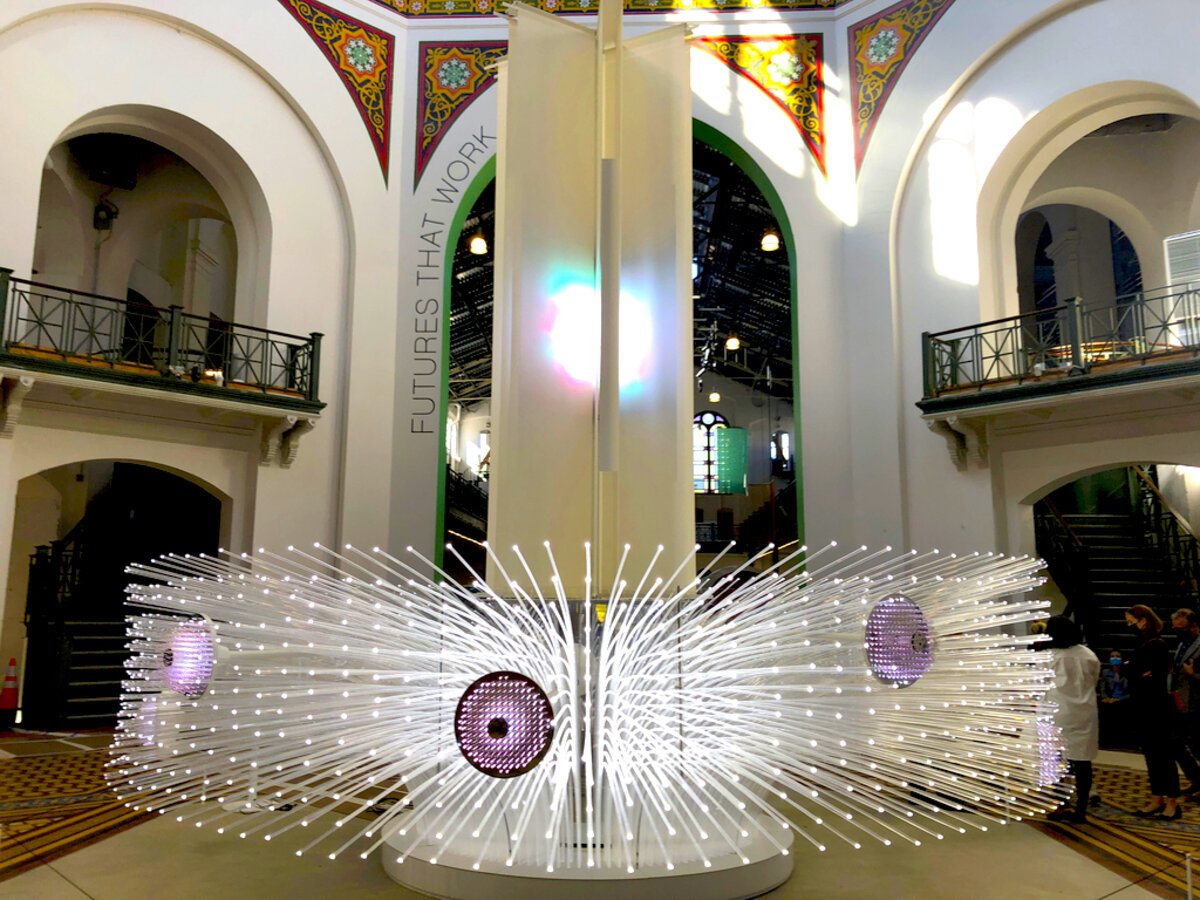
To quote baseball philosopher Yogi Berra, “The future ain’t what it used to be.”
It can be a challenge these days not to make long mental worry lists about what might lie ahead. But a more productive mindset might ask: What should the future be like? How do we make it better than today? How do we make that happen?
In a winter of international and domestic U.S. tensions, a new exhibition titled “Futures” at the Smithsonian Institution in Washington invites visitors to explore intriguing exhibits showing future possibilities. It then asks them to join in creating that future, such as in designing a city of tomorrow (with an assist from some artificial intelligence).
The exhibit has taken over the Smithsonian’s venerable Arts and Industries Building (AIB), which had been shuttered nearly two decades for repairs. At one time it housed treasures such as the Wright brothers’ airplane, the original “Star-Spangled Banner,” and the Apollo 11 command module used as part of the first moon landing. All were relocated to other Smithsonian venues long ago.
Imagining future possibilities can fire up visions of a better society. What about a ground-based, 600-mph tube transit system that could transport travelers between American cities in minutes? That’s just one possibility presented.
Calls for exhibits to include in “Futures” brought eager replies.
“Everybody wanted to be part of this exhibition because there’s a real hunger on the part of artists, designers, and scientists to be part of a narrative that allows people to imagine the future they want and not the future they fear,” Rachel Goslins, director of the AIB, told The Guardian. “To be part of an exhibition that came from a place of hopefulness about the future was attractive.”
“Futures” will run through July 6, 2022.
Change alone doesn’t always represent progress. The exhibit reminds us that inventions that at one time showed great promise, such as plastics, now may be seen as mixed blessings (plastic pollution).
Trying to predict what lies ahead is a notoriously futile business. But imagining possibilities can lead thinking into fresh, innovative channels.
“What we want people to take away is that there are solutions out there, there are answers out there,” Ms. Goslins says. “We have to pick them, and we have to invest in them.”
Last year the Smithsonian celebrated its 175th year. “Futures” is a reminder “that the best museums are as much about today and tomorrow as they are about yesterday,” writes Lonnie G. Bunch III, secretary of the Smithsonian Institution, in its magazine.
As 2022 unfolds, inspiration and creativity are needed more than ever. Finding innovative answers isn’t mysterious: It’s mostly accomplished through hard work, as Thomas Edison and others have pointed out.
New ideas are available to any of us as we stop and quietly listen for our own best thoughts.

A Christian Science Perspective
Each weekday, the Monitor includes one clearly labeled religious article offering spiritual insight on contemporary issues, including the news. The publication – in its various forms – is produced for anyone who cares about the progress of the human endeavor around the world and seeks news reported with compassion, intelligence, and an essentially constructive lens. For many, that caring has religious roots. For many, it does not. The Monitor has always embraced both audiences. The Monitor is owned by a church – The First Church of Christ, Scientist, in Boston – whose founder was concerned with both the state of the world and the quality of available news.
Harmonizing relationships
- Quick Read
- Read or Listen ( 3 Min. )
-
By Elizabeth Mata
Sometimes joy and harmony in our interactions with certain people can seem out of reach. But as one woman experienced, no relationship is beyond the healing reach of divine Love.
Harmonizing relationships
The perfect human relationship? For most of us the jury might be out on whether such a thing truly exists. But the concept of harmony and peace in relationships is something more familiar. We know when those qualities are there and when they aren’t.
Sometimes joy and affection can feel missing or distant. And what if we have worked long and hard at trying to find or restore harmony in a relationship, but nothing seems to change?
My study and practice of Christian Science has helped me see that it is indeed possible to experience more and more how natural and normal harmony is in all our dealings with others.
As much as we want to smooth out the rough edges of our relationships, genuine harmony includes so much more than simply getting along. When we understand that harmony is a gift to all of us from God, Spirit – and that God can give only good to us, His children – we see that the source of harmony is spiritual, not material. This means it is always available, permanent, and inseparable from our true spiritual identity – no matter what the material senses are telling us.
So, the harmony God has bestowed on all of us is not dependent on how our relationships are going. But it can always uplift and heal them.
In his Sermon on the Mount, Christ Jesus says, “Blessed are the peacemakers: for they shall be called the children of God” (Matthew 5:9). Peace must and can be expressed by all. Actually, freedom from disturbance within and in our interactions with others is inherent in our identity as the offspring of God. And our efforts to understand and live this spiritual fact bless us and those around us, too.
I was only a few years into my study of Christian Science when I had a roommate that wouldn’t talk to me. After weeks of this, I felt really discouraged and wanted to give up on making an effort to connect with her.
But I didn’t, because just in those few years, Christian Science – anchored in the Bible, especially Jesus’ teachings – had brought so much healing to my life. I had been learning to pray to feel God’s caring presence and love for all of us. I still felt I had a lot of growing to do to grasp the teachings of Christian Science, but I wanted to put into practice what I did know.
So I began to pray about the situation. My prayer was very simple: to just love my roommate from the basis that God, divine Love itself, is the true source of love. I reasoned prayerfully that God created us both to love and be loved. This was where the harmony of our relationship was grounded, whether it looked that way or not. Then, with an open heart, I waited patiently with expectancy. But nothing changed.
Honestly, I didn’t know what else to do humanly. But I trusted that if there was something I could do to break the silence, God would show me what it was and how to do it. I found a sense of peace there.
Then an unexpected opportunity arose to ask my roommate, in a fresh way, why she wouldn’t talk to me. This led to her apologizing profusely. Of course I welcomed her apology, and that was the end of the problem. Our relationship became friendly.
As happy as I was for this outcome, I was most grateful for this proof of how tenderly Love cared for us both and our relationship.
Part of a hymn in the “Christian Science Hymnal” points to a wider promise we can all take to heart:
As stars in their courses never contend,
As blossoms their hues in harmony blend,
As bird voices mingle in joyful refrain,
So God’s loving children in concord remain.
(Irving C. Tomlinson, No. 236, © CSBD)
No effort to identify ourselves and others with our God-given harmony is in vain. Every relationship is within reach of Love’s infinite solutions.

A message of love
Nuts, anyone?

A look ahead
Thanks for joining us. This afternoon, a judge in Georgia sentenced the three men convicted of murdering Ahmaud Arbery to life in prison. For that and other breaking news, please visit our First Look page.
Come back Monday, when we’ll have a story on a political race that could be one of the wildest of the 2022 midterms – the struggle over Georgia’s governor’s chair.



